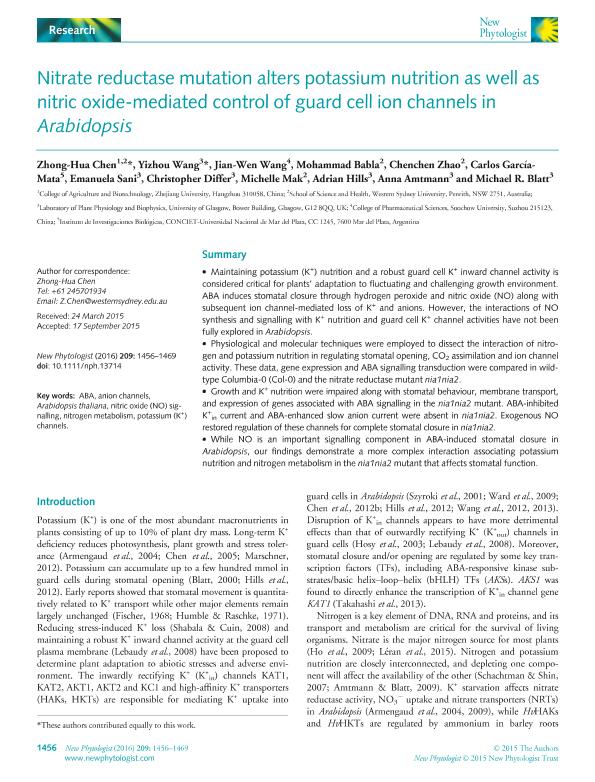Artículo
Nitrate reductase mutation alters potassium nutrition as well as nitric oxide-mediated control of guard cell ion channels in Arabidopsis
Chen, Zhong Hua; Wang, Yizhou; Wang, Jian Wen; Babla, Mohammad; Zhao, Chenchen; Garcia-Mata, Carlos ; Sani, Emanuela; Differ, Christopher; Mak, Michelle; Hills, Adrian; Amtmann, Anna; Blatt, Michael R.
; Sani, Emanuela; Differ, Christopher; Mak, Michelle; Hills, Adrian; Amtmann, Anna; Blatt, Michael R.
 ; Sani, Emanuela; Differ, Christopher; Mak, Michelle; Hills, Adrian; Amtmann, Anna; Blatt, Michael R.
; Sani, Emanuela; Differ, Christopher; Mak, Michelle; Hills, Adrian; Amtmann, Anna; Blatt, Michael R.
Fecha de publicación:
03/2016
Editorial:
Wiley Blackwell Publishing, Inc
Revista:
New Phytologist
ISSN:
0028-646X
Idioma:
Inglés
Tipo de recurso:
Artículo publicado
Clasificación temática:
Resumen
Maintaining potassium (K+) nutrition and a robust guard cell K+ inward channel activity is considered critical for plants' adaptation to fluctuating and challenging growth environment. ABA induces stomatal closure through hydrogen peroxide and nitric oxide (NO) along with subsequent ion channel-mediated loss of K+ and anions. However, the interactions of NO synthesis and signalling with K+ nutrition and guard cell K+ channel activities have not been fully explored in Arabidopsis. Physiological and molecular techniques were employed to dissect the interaction of nitrogen and potassium nutrition in regulating stomatal opening, CO2 assimilation and ion channel activity. These data, gene expression and ABA signalling transduction were compared in wild-type Columbia-0 (Col-0) and the nitrate reductase mutant nia1nia2. Growth and K+ nutrition were impaired along with stomatal behaviour, membrane transport, and expression of genes associated with ABA signalling in the nia1nia2 mutant. ABA-inhibited K+ in current and ABA-enhanced slow anion current were absent in nia1nia2. Exogenous NO restored regulation of these channels for complete stomatal closure in nia1nia2. While NO is an important signalling component in ABA-induced stomatal closure in Arabidopsis, our findings demonstrate a more complex interaction associating potassium nutrition and nitrogen metabolism in the nia1nia2 mutant that affects stomatal function.
Archivos asociados
Licencia
Identificadores
Colecciones
Articulos(IIB)
Articulos de INSTITUTO DE INVESTIGACIONES BIOLOGICAS
Articulos de INSTITUTO DE INVESTIGACIONES BIOLOGICAS
Citación
Chen, Zhong Hua; Wang, Yizhou; Wang, Jian Wen; Babla, Mohammad; Zhao, Chenchen; et al.; Nitrate reductase mutation alters potassium nutrition as well as nitric oxide-mediated control of guard cell ion channels in Arabidopsis; Wiley Blackwell Publishing, Inc; New Phytologist; 209; 4; 3-2016; 1456-1469
Compartir
Altmétricas



